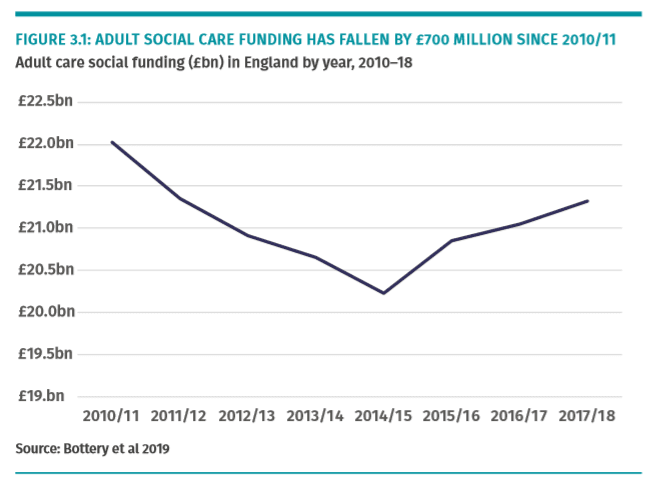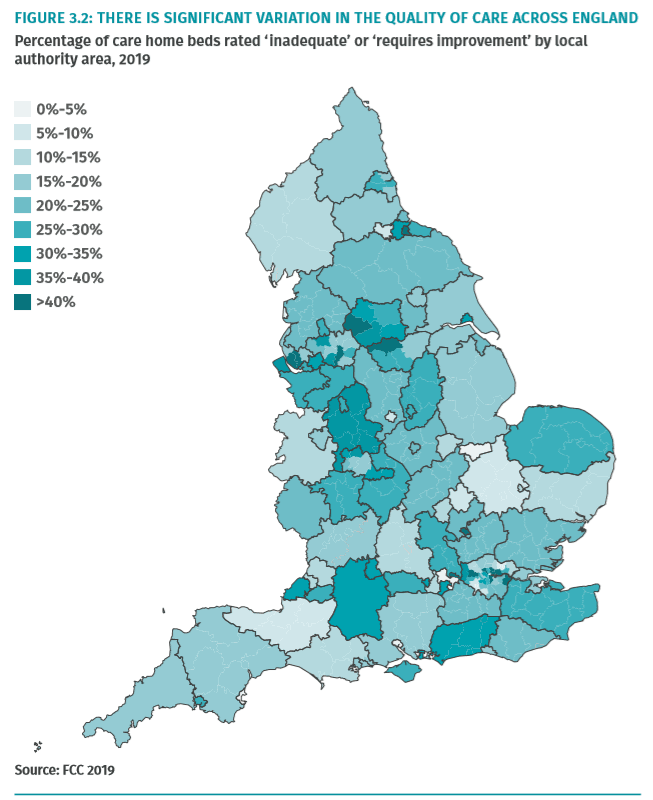Blueprint for radical reform of social care to end the crisis proposed by IPPR
12 Nov 2019Press Story
Think tank sets out comprehensive plan including free personal care, ethical commissioning, enforced standards and good pay for care staff
As political parties rush to compile competing manifestos, the IPPR think tank today puts forward its blueprint for a long-term settlement for adult social care. The blueprint includes calls for free personal care and an Ethical Commissioning Charter requiring providers to meet minimum standards or face being replaced.
Social care has faced a near-permanent crisis, argues the report. While resources have become increasingly constrained, demand for social care has been rising. Data shows that 84 per cent of beds are now provided by the private sector. According to the report, many in the sector are now failing to deliver high-quality care for all and operating risky debt-fuelled business models. To address this, social care desperately needs a long-term funding settlement.
But money alone will not transform the sector. IPPR calls for a bold reform plan in order to ensure that this investment spreads best practice and stamps out inadequate provision and outdated models of care. Today’s report Ethical Care sets out a blueprint for that plan:
A Long Term Funding Settlement
- Introduce free personal care in England and commit to meeting pressures from an ageing society at a cost of up to £10 billion per year by 2020/21. This would expand the principle of free at the point of need from the NHS to social care. This should be funded out of increases in general taxation. Simultaneous reforms to integrate care with the health service could save the NHS up to £4.5 billion a year.
- Create a Social Care Transformation Fund worth £2 billion over five years (£400 million per year) to spread best practice care models, improving care quality and standards.
A New Deal for Workforce
- IPPR research has estimated that by 2028 there will be a shortage of over 400,000 workers in social care. State funding social care providers should be required to pay at least the real living wage. This measure will help tackle the workforce retention crisis and ensure carers receive fair pay for their hard work. Alongside this, a new system of sectoral collective bargaining for social care workers should be introduced to drive up working conditions.
- The Care Certificate should become a robust and mandatory licence to practise for all care workers, as is standard practice for other care professions like nursing and social work.
Ethical Commissioning Charter
- There is significant variation of care quality across the country as providers approach a ‘tipping point’ where quality is put at risk by budgetary constraints, according to the think tank’s analysis based on data donated by Future Care Capital (FCC). To ensure good quality care for all, social care providers who receive state funding should be required to meet basic standards on workforce pay and conditions, quality of care and their financial management or face being replaced by state providers.
- This charter would demand that all providers receiving state funding meet certain ethical conditions. IPPR research suggests that this should include compulsory conditions, set at a national level, across three key domains:
- Workforce: Contracts should only be awarded to organisations that pay the real living wage, provide adequate training and engage in sectoral collective bargaining.
- Quality: Contracts should only be awarded to organisations with a track record of high-quality care.
- Transparency: Contracts should only be awarded to organisations that pay their fair share of taxation and are financially sustainable.
- The government should provide up to £7.5 billion of funding to replace underperforming residential providers who fail to meet the Ethical Commissioning Charter conditions.
Harry Quilter-Pinner, IPPR Senior Research Fellow, said:
"Every political leader for a generation has promised to solve the social care crisis but none have kept their word. This must change. All political parties should commit to introducing and fully funding free personal care, so social care is 'free at the point of need' just like the NHS.
“Money alone will not solve the problem. Our social care system needs bold reform. At IPPR, we are calling for all political parties to sign up to an ethical care charter. This would ensure that only providers that give their staff the living wage, deliver high quality care and pay their fair share of taxes in the UK get access to taxpayers money."
ENDS
CONTACT
David Wastell, Head of News and Communications: d.wastell@ippr.org
Robin Harvey, Digital and Media Officer: r.harvey@ippr.org
NOTES TO EDITORS
- The IPPR paper, Ethical Care: A bold reform agenda for adult social care by Harry Quilter-Pinner, will be published at 0001 on Tuesday 12 November. It will be available for download at: http://www.ippr.org/research/publications/ethical-care
- Advance copies of the report are available under embargo on request
- Data to support development of the briefing paper was provided by Future Care Capital (FCC), a leading independent charity undertaking research to advance current thinking on health and social care policy. FCC will publish its research report, Data That Cares, later this month. Recent FCC reports on care include Facilitating Care Insight to Develop Caring Economies and A Forgotten Army: Coping as a Carer.
- Figure 3.1: Adult social care spending has fallen by £700 million since 2010/11

- Figure 3.2: There is significant variation in the quality of care across England. Data donated by Future Care Capital

- IPPR is the UK’s pre-eminent progressive think tank. With more than 40 staff in offices in London, Manchester, Newcastle and Edinburgh, IPPR is Britain’s only national think tank with a truly national presence. www.ippr.org